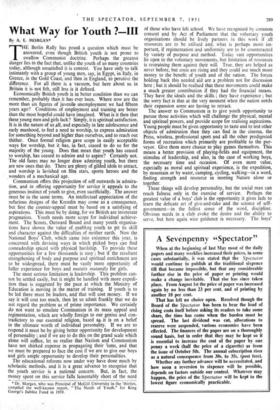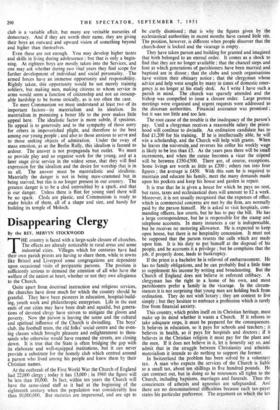What Way for Youth ?—III
By A. E. MORGAN* HE Berlin Rally has posed a question which must be answered, even though British youth is not prone to swallow Communist doctrine. Perhaps the greatest danger lies in the fact that, unlike the youth of so many countries today, although unsatisfied it is content. You have only to talk intimately with a group of young men, say, in Egypt, in,Italy, in Greece, in the Gold Coast, and then in England, to perceive the difference. For all there is a vacuum, but here about us in Britain it is not felt, still less is it defined.
Economically British youth is in better condition than we can remember, probably than it has ever been. Where now are the more than six figures of juvenile unemployment we had fifteen years ago? Conditions of employment and training are better than the most hopeful could have imagined. What is it then that these young men and girls lack? Simply, it is spiritual satisfaction. It is in the nature of us All, and especially in late adolescence and early manhood, to feel a need to worship, to express admiration for something beyond and higher than ourselves, and to reach out thither. Once formal religion gave scope in easily acceptable ways for worship, but it has, in fact, ceased to do so for the majority of the young. Does that mean that youth has ceased to worship, has ceased to admire and to aspire? Certainly not. The old fanes may no longer draw admiring youth, but there are new ones that do. There are plenty of gilded idols to attract, and worship is lavished on film stars, sports heroes and the wonders of a mechanical age.
Communism offers this projection of self outwards in admira- tion, and in offering opportunity for service it appeals to the generous instinct of youth to give, even sacrificially. The answer must be in the same terms. An intellectual appreciation of the nefarious designs of the Kremlin may come as a consequence, but first the counter-appeal must be based on a satisfying of aspirations. This must be by doing, for we British are inveterate pragmatists. Youth needs more scope for individual achieve- ment. The Scouts, Outward Bound and many youth organisa- tions have shown the value of enabling youth to pit its skill and character against the difficulties of mother earth. Now the National Boys' Club, which came into existence this year, is concerned with devising ways in which picked boys can find comradeship spiced with physical hardship. To provide these opportunities for a few thousands is easy ; but if the resultant strengthening of body and purpose and spiritual enrichment are to be widespread, there must be vastly more opportunity of fuller experience for boys and mutatis mutandis for girls.
The most serious limitation is leadership. This problem can- not be settled easily, but it might be handled with more expedi- tion than is suggested by the pace at which the Ministry of Education is moving in the matter of training. If youth is to be led there must be leaders, and that will cost money. If we say it will cost too much, then let us admit frankly that we do not regard the problem as of prime importance. We certainly do not want to emulate Communism in its mass appeal and regimentation, which are wholly foreign to our genius and con- tradictory to our essential religion, based as.- it is on a belief in the ultimate worth of individual personality. If we are to respond it must be by giving better opportunity for development of personality ; and if we are to do this on the grand scale which alone will suffice, let us realise that Nazism and Communism have not shirked expense in propagating their 'isms, and that we must be prepared to face the cost if we are to give our boys and girls ample opportunity to develop their personalities: The educational reforms now under way have done much by scholastic methods, and it is a great advance to recognise that the youth service is a national concern. But, in fact, the money spent on this service falls lamentably short of the need • Dr. Morgan, who was Principal of McGill University in the 'thirties, compiled the well-known report, " The - Needs of Youth." for King George's Jubilee Fund in 1939. of those who have left school. We have recognised by common consent and by Act of Parliament that the voluntary youth organisations should be lively partners in this work if all resources are to be utilised and, what is perhaps more im- portant, if regimentation and uniformity are to be counteracted by variety of purpose and method. Today vast opportunities lie open to the voluntary movements, but limitation of resources is restraining them against their will. True, they are helped as never before, but costs are rising and they could use much more money to the benefit of youth and of the nation. The forces holding back this needed aid are a problem not for discussion here ; but it should be realised that these movements could make a much greater contribution if they had the financial means. They have the ideals and the skills ; they have experience ; but the sorry fact is that at the very moment when the nation needs their expansion some are having to retract.
The answer to Communism is to give youth opportunity to pursue those activities which will challenge the physical, mental and spiritual powers, and provide scope for realising aspirations. Young people must be given opportunity to taste and to test other objects of admiration than they can find in the cinema, the Press, wireless, professional sport and all the other predigested forms of recreation which pnmarily are profitable to the pur- veyor. Give them more chance to play games themselves. This means a better provision of playing-fields and equipment, the stimulus of leadership, and also, in the case of working boys. the necessary time and occasion. Of even more value. especially as moral and spiritual experience, is the expedition. by mountain,or by water, camping, cycling, walking—in a word, finding strength and resource in meeting Nature alone or together. These things will develop personality, but the social man can reach fulness only in the exercise of service. Perhaps the greatest value of a boys' club is the opportunity it gives lads to learn the delicate art of give-and-take and the science of self- government—in the fullest sense of the word, discipline. Obvious needs in a club evoke the desire and the ability to serve, but here again wise guidance is necessary. The boys' club is a variable affair, but many are veritable nurseries of democracy. And if they are worth their name, they are giving their boys an outward and upward vision of something beyond and higher than themselves.
Even these are not enough. You may develop higher tastes and skills in living during adolescence ; but that is only a begin- ning. At eighteen boys are mostly, taken. into the Services, and one may ask whether during two vital years they find scope for further development of individual and social personality.. The armed forces have an immense opportunity and responsibility. Rightly taken, this opportunity would be not merely training soldiers, but making men, making citizens to whom service in arms would seem a function of citizenship and not an inescap- abje hardship to be borne stoically, as is too often the case.
To meet Communism we must understand at least two of its important factors—its materialism and its idealism. Its materialism in promising a better life to the poor makes little appeal here. The idealistic factor is more subtle, if specious. Its appeal is to generosity and to the sympathy of those sorry for others in impoverished plight, and therefore to the best among our young people ; and also to those anxious to serve and to those seeking objects of admiration. Under the sway of mass emotion, as at the Berlin Rally, this idealism is fanned to ardour. The -answer is not propaganda but outlet. We must so provide play and so organise work for the young, and at a later stage civic service in the widest sense, that they will find expression for the idealism and the desire for worship that is in us all. The answer must -be materialistic and idealistic. Materially the danger is not in being maw-crammed but in being starved, but this is no longer present in our country. The greatest danger is to be a clod untroubled by a spark, and that is our danger. Unless there is flint for young steel there will be no spark. Clods are plastic, and Communism is ready to make bricks of them, all of a shape and size, and bandy for building its temple of Moloch.



































 Previous page
Previous page